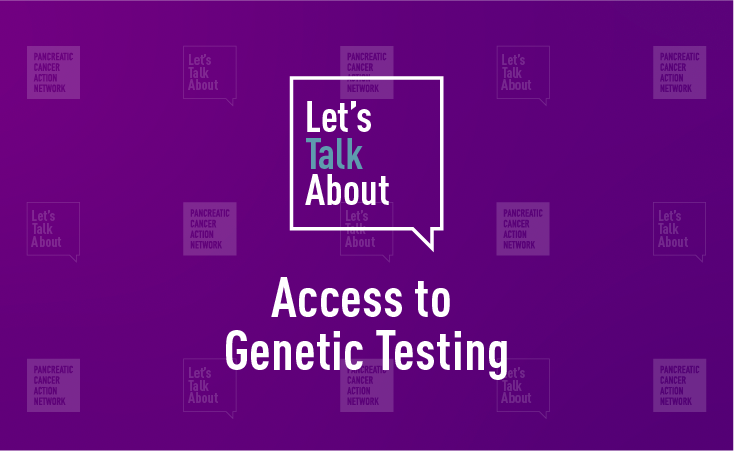
Editor’s note: Throughout April, which is Minority Health Month, we’re raising awareness of the inequalities that minority communities experience when faced with pancreatic cancer. In 2021, PanCAN provided funding for the REGENERATE study, which stands for Racial/ethnic Equity in Genetic Education, Risk Assessment and Testing. In this blog post, first published in February of 2022, we take a closer look at this study and why it’s important to better understand how Black and Latino/a/x communities perceive genetic education, genetics care and cancer prevention strategies for pancreatic cancer.
Earlier this month, in honor of Black History Month, we discussed increased incidence and mortality of pancreatic cancer among Black Americans compared to other racial and ethnic groups. Efforts to close the care gap and ensure people of all demographics have their best possible outcomes start with awareness of a disease’s risk factors and symptoms.
Nicolette Juliana Rodriguez, MD, MPH, has seen firsthand how structural racism and discrimination impact the care you receive. “As a first-generation Latina, I have witnessed the healthcare inequities that my family encountered when interfacing with the healthcare system,” she said.

Dr. Nicolette Juliana Rodriguez
“A big inspiration for me to become a physician was my desire to provide equitable care and be an agent of change.”
Dr. Rodriguez’ inspiration also came from her mother, an immigrant from Colombia. Her mom worked extremely hard to allow Dr. Rodriguez to pursue her educational dreams, while reminding her to “stop and smell the flowers” and maintain a work-life balance. In the midst of supporting her daughter, Dr. Rodriguez’ mother also pursued her own dream – learning English and continuing her work as a bacteriologist in the U.S.
Dr. Rodriguez is now a gastroenterology, hepatology, and endoscopy fellow at Brigham and Women’s Hospital as well as a postdoctoral research fellow in the Division of Cancer Genetics and Prevention at Dana-Farber Cancer Institute under the mentorship of Dr. Sapna Syngal.
“Gastroenterology gives me a unique opportunity to work closely with patients in clinic and also have the privilege of caring for my patients in the procedural setting by performing their screening colonoscopies, for example,” Dr. Rodriguez said.
In addition to her clinical practice, Dr. Rodriguez’ research focuses on health equity and access to cancer genetics and early cancer interception strategies – ways to find the disease in very early stages or even prevent it altogether. Specifically, she aims to thoughtfully evaluate racial/ethnic inequities in cancer genetics and prevention efforts, with a goal to improve access to genetic education, testing and preventative cancer care among Black and Latino/a/x communities.
In 2021, PanCAN provided funding for the REGENERATE study, which stands for Racial/ethnic Equity in GENetic Education, Risk Assessment and Testing. Dr. Rodriguez serves as the project lead for REGENERATE.
“We are absolutely thrilled and honored that PanCAN is funding the REGENERATE study,” Dr. Rodriguez said. “The first phase of REGENERATE will help us gain a better understanding on how Black and Latino/a/x communities perceive genetic education, genetics care and cancer prevention strategies for pancreatic cancer.”
This is particularly important, she noted, so that these historically marginalized populations have equitable access to genetics care. “We are seeking to learn about how pancreatic cancer affects their communities and how their finding out their pancreatic cancer risk may help protect themselves and their families.”
Reflecting on Black History Month, Dr. Rodriguez said, “It’s a time when we commemorate and highlight the achievements of Black Americans. It is also a time to reflect on the persistence of structural racism, discrimination and the resulting inequities within our healthcare system and beyond.
“Black History Month allows us to also celebrate people and organizations working to change these systems and reduce healthcare inequities.”
Increasing education about and access to genetic testing among historically marginalized populations represents an important opportunity to overcome some of these inequities. About 5-10% of pancreatic cancer cases are known to involve an inherited genetic risk – and this is true for individuals who didn’t previously have a known family history of the disease.
That’s why PanCAN recommends that all pancreatic cancer patients undergo genetic testing for inherited mutations. And if their results are positive or unknown, their family members are encouraged to seek genetic counseling to determine if genetic testing would be appropriate for them.
“Suppose genetic testing reveals an inherited genetic change,” Dr. Rodriguez said. “In that case, this can have implications for cancer monitoring or prevention strategies, which can potentially identify pancreatic cancer in its early stages when it is more amenable to treatment and surgical interventions.”
This is especially important when it comes to historically marginalized communities like Black and Latino/a/x populations. Poorer outcomes can be due to many factors, including decreased access to cancer care based on geographic or financial barriers as well as lower referral rates to genetics and oncology care compared to white populations.
“Establishing trusting patient and provider relationships is critical when recommending genetic testing,” Dr. Rodriguez said.
“The REGENERATE study wants to truly understand from Black and Latino/a/x communities how best to move forward with research that could benefit these populations and include them within the research process.”
If you meet the following criteria and are interested in participating in a REGENERATE focus group, please email REGENERATE@DFCI.harvard.edu.
- Identify as Black or Latino/a/x
- 18 years old or older
- Have a personal or family history (first-degree or second-degree relative) of pancreatic cancer
- Have internet access, and
- Live in the United States














